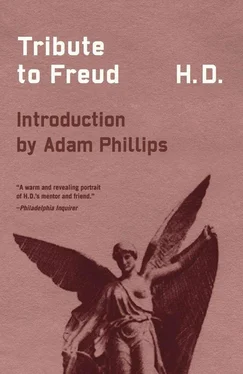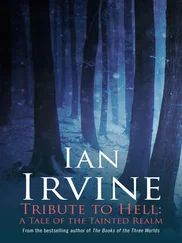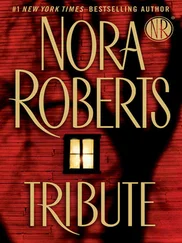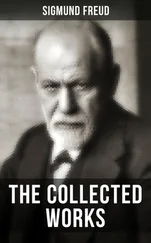Those two were twins in the old fairy story.
My findings are important to me and have an atmosphere.
Before I could walk properly, I could tell time. Long before I learned my alphabet, I knew the three clock letters.
I would be sent out by my nurse to find out what time it was. There was the grandfather clock on the landing. But surely I could walk there? Perhaps it was easier or pleasanter to slide down the shallow steps, for I always seem to be looking up from the floor at the clock-face. Yes, I could walk. I returned to the nursery with my findings. “The little hand is at the V.” I could not remember both hands at the same time or else I wanted fresh adventure. The big hand would keep me busy. “It is at the I, it is at the II,” or much later, “It has nearly got to the X.”
So I am back again in the mysteries; the childhood of the individual is the childhood of the race, wrote our Professor.
My half-brother Eric and my father talked of time in different dimensions, mean-time or siderial-time (whatever that was) and some other time whose name I can’t remember. My interest in “numbers” was checked at the time of my father’s accident and though I did not remember the accident, I remembered how long-division had blocked me or set a wall between my happy and most unhappy school-days. It is significant that my half-brother came to live with us, about this time. He was known generally as the “young Professor.” It was Eric who finally nursed me over my “resistance” to long-division. He brought me a copy of Jane Eyre and a Little Women with the original illustrations. The Little Women wore the bell-skirts that so fascinated me in the old pictures of the Seminary.
I do not know where or how I actually made this transference. But today’s transference or yesterday’s is explicit in the little green phial of smelling-salts that I carry in my handbag and that I “accidentally” let fall on the Professor’s carpet or left under the pillow of the couch. I do not ask the Professor where he found the little bottle. His air is mock-triumphant as he returns it to me, “Ah — you forgot this.” He knows that I know the symbolism of the “lost” umbrella.
And now that this transference is understood between us, I go on to talk of Lawrence. The Professor said that Lawrence had impressed him in the ending of one book. I did not ask him which book. The Professor said that Lawrence impressed him as “being unsatisfied but a man of real power.”
Freud says there are always a number of explanations for every finding, two or a multiple. In interpreting my own dreams, he said that I showed much more knowledge of psychoanalysis than he had expected of me. Perhaps he meant me to contradict him when he said that my looking at my watch meant that I was bored and wanted the session to end. I did not think that he meant me to take him piedde la lettre when he said that I might be impatient with life, desiring even his death, so as to avoid analysis. Or did he mean me to contradict this? What should I say?
There were those statues in the cottage in Cornwall. There was a row of them along the mantelpiece of an empty room. The house was only partly furnished. I went there in March 1918. It was D. H. Lawrence who had told me of the old house, it was called Rosigran. Lawrence said it was haunted. Was I afraid of ghosts? I said I had never met one.
Here in the semicircle on the table in the other room, is the same or somewhat the same array of images, Osiris, Isis. Perhaps I am afraid of ghosts. But when the Professor said, “Perhaps you are not happy,” I had no words with which to explain. It is difficult to explain it to myself or to find words to scribble in my note-book. It is not a question of happiness, in the usual sense of the word. It is happiness of the quest.
I am on the fringes or in the penumbra of the light of my father’s science and my mother’s art — the psychology or philosophy of Sigmund Freud.
I must find new words as the Professor found or coined new words to explain certain as yet unrecorded states of mind or being.
He is Faust, surely.
We retreat from the so-called sciences and go backward or go forward into alchemy. He said, I was impatient with him. He was turning a heavy seal-ring on his finger.
I said that I could not lose him, I had had his books before I met him and would have them again when I left Vienna. There is a formula for Time that has not yet been computed.
March 9
I dream of a Cathedral. I walk through Stephens dom almost daily and, as well, I had been interested in some pictures of Chartres that I had seen in one of the café’s illustrated papers. Two boys are with me in this dream, the older one was showing me around, I felt the little one was de trop. I had for some reason tipped the big one, now I must give something to the little one. This annoyed me. (I had been concerned the day before as to the exact tip to give the two page-boys in the hotel.)
I seem to have lost the big boy, so I regretfully annex the smaller.
My two brothers? Or my father and his attractive older brother? My older brother and my father’s older brother were both lost in the wars.
The boys in the dream are not recognizably the hotel page-boys. They are ghosts. They are, that is, “ghosting” for another or others; when the ghosts take form as brothers or as uncle-father, it will no doubt be seen that they again are ghosting. Or rather if we pursue the dream content, the intermediate ghosts, should they manifest, would be seen to be a step between brothers or uncle-father. We are all haunted houses.
It is really the Cathedral that is all-important. Inside the Cathedral we find regeneration or reintegration. This room is the Cathedral.
The Professor said, “But you are very clever.” It is not I who am clever. I am only applying certain of his own findings to my personal equation. The house is home, the house is the Cathedral. He said he wanted me to feel at home here.
The house in some indescribable way depends on father-mother. At the point of integration or regeneration, there is no conflict over rival loyalties. The Professor’s surroundings and interests seem to derive from my mother rather than from my father, and yet to say the “transference” is to Freud as mother does not altogether satisfy me. He had said, “And — I must tell you (you were frank with me and I will be frank with you), I do not like to be the mother in transference — it always surprises and shocks me a little. I feel so very masculine.” I asked him if others had what he called this mother-transference on him. He said ironically and I thought a little wistfully, “O, very many.”
But now he said he would show me a little new toy. He is delighted with a Coptic clay figure, sent him by a former student. The little image is startlingly like Yofi. Yofi sits as usual on the floor, emblematic, heraldic. The little clay dog looks like Yofi and I cannot help wondering if the donor of the figure on the shelf opposite the couch had noted the striking resemblance of this Etruscan image, with the pointed beard and the thin etched smile, to our Professor.
Today there are red tulips on the famous table with the row or semicircle, Osiris, Isis, Athené, and the others, with the ivory Vishnu in the center.
The Professor has gone into the other room to find another dog to show me. He brings back a broken wooden dog. It is a toy from a tomb in Egypt.
I tell him the only Egyptian dog I remember is one in the Louvre; was the jackal on the standard a dog? The only Egyptian dog that I remember was exactly like his daughter Anna’s Wulf.
Yes (I repeated), the Cathedral of my dream was Sigmund Freud. “No,” he said, “not me — but analysis.”
Читать дальше











